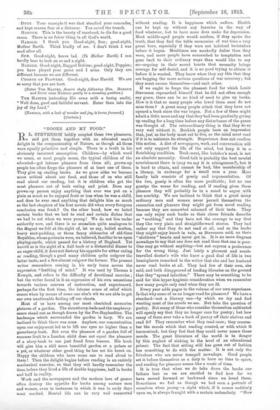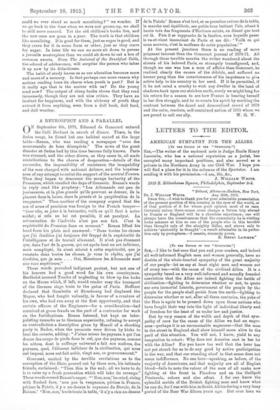"BOOKS AND MY FOOD."
RL. STEITENSON boldly coupled these two pleasures, and put them together with an educated man's delight in the companionship of Nature, as though all three were equally primitive and simple. There is a truth in his obviously incorrect assumption. Children—by which word we mean, as most people mean, the typical children of the educated—get intense pleasure from them all; grown-up people too often forgo the pleasure of at least one of them. They give up reading books. As we grow older we become more critical about our food, and those of us who still read about our reading, but it is children who get the most pleasure out of both eating and print. Does any grown-up person enjoy anything that ever was put on a plate as much as he enjoyed fruit or ices when he was a child, and does he ever read anything that delights him as much as the last chapters of his first novels did when every foregone conclusion was fresh ? On the other hand, how we hated certain books that we had to read and certain dishes that we had to eat when we were young We do not live under authority now, and there is no sensation quite analogous to the disgust we felt at the sight of, let us say, boiled mutton, heavy suet-pudding, or those fancy obituaries of old-time Royalties, whose portraits were, we believed, familiar to us upon playing-cards, which passed for a history of England. Yet horrid as is the eight of a dull book or a distasteful dinner to an eager child, it does not destroy his appetite for either eating or reading, though a good many children quite outgrow the latter taste, and a few almost outgrow the former. The present writer remembers coming in his early teens across the expression "loathing of mind." It was used by Thomas Kemple, and refers to the difficulty of devotional exercise ; but the writer found in it an expression of his own sensations towards various courses of instruction, and experienced, perhaps for the first time, the intense sense of relief which comes when by means of some one else's wit we are able to get our own unutterable feeling off our chests.
Most of us have among our most cherished memories pictures of a garden. The strawberry-beds and the raepberry- canes stand out as though drawn by the Pre-Raphaelites. The landscape which surrounded the garden is hazy. We are inclined to think there was none. Anyhow, our concentration upon our enjoyment led us to lift our eyes no higher than a gooseberry-bush. But even the pleasure of a garden full of summer fruit to a London child does not equal the pleasure of a story-book to one just freed from lessons. His book will give him a still more beautiful garden or a palace or a pet, or whatever other good thing he has set his heart on. Happy the children who have some one to read aloud to them t Then the delight begins before reading is an entirely mechanical exercise, so that they will hardly remember the time before they lived a life of double happiness, half in books and half in reality.
Work and the newspapers and the modern lore of games often destroy the appetite for books among mature men and women, even in instances in which it was in early days moat marked. Mental life can be very well zunported without reading. It is happiness which suffers. Health can be kept up without any luxuries in the way of food whatever, but to have none does make for depression. Most middle-aged people would. confess, if they spoke the truth, that they find the table economies of war time a very groat bore, especially if they wore not habitual teetotalers before it began. Mealtimes are markedly duller than they were, and more people have succumbed to temptation and gone back to their ordinary ways than would like to say so-arguing in their secret hearts that necessity brings courage for self-denial, and it is no good trying to obtain it before it is wanted.. They know when they say this that they are begging the more serious questions of war economy ; but they must excuse themselves—and each other.
If we ought to forgo the pleasant food for which Louis Stevenson reproached himself that he did not often enough say grace, there can be no kind of need to give up books. How is it that so many people who loved them once do not miss them P A great many people admit that they have not opened a book since the war began. Not a few of them might admit a little more and say that they bad been gradually giving up reading for a long time before any disturbance of the peace was thought of. The extraordinary thing is that they do so very well without it, Bookish people have an impression that, just as the body must eat to live, so the mind must read if it is tonniaintain its strength. Experience does not confirm this notion. A diet of newspapers, work, and conversation will not only support the life of the mind, but keep it in a flonrishinecondition, Book-meat, like butcher's meat, is not an absolute necessity. Good talk is probably the best mental nourishment there is (may we say it is nitrogenous ?), but it is hard to obtain, and cannot be had, like membership of a library, in exchange for a small sum a year, Most family talk consists of gossip and argumentation. Of the two, gossip is often the more profitable ; but no one gossips the worse for reading, and if reading gives them pleasure they will probably be in a mood to argue with less acerbity. We are inclined to think that a great many ordinary men and women never permit themselvee the recreation and pleasure they might get from novel reading because they are somewhat ashamed of their taste. They can only enjoy such books as their clever friends describe as "soothing," and they have not the courage to say that they like very plain and straightforward stories. They had rather say that they do not read at all, and so the books they might enjoy knock in vain, as Stevenson said, on their " stubborn" hearts and never get in. It is no more disgrace nowadays to say that one does not read than that one is poor. One may go without anything—but not express a preference for the wrong thing. Just lately a pleasant and much- travelled doctor's wife who knew a good deal of life in two hemispheres remarked to the writer that she and her husband never read books at all. They had few of their own, she said, and both disapproved of lending libraries on the ground that they " spread infection." There may be something to be said for this hyper-hygienic consideration when we remember how many people only read when they are ill.
Every year adds pages to the volume of our own experience. Is that why some of us no longer read for pleasure P We have a standard—not a literary one—by which we try and find wanting most of the novels we see. But take the question of poetry. Not many of those who consider themselves cultivated will openly say that they no longer care for poetry; but how many of them ever take a book of poetry off their shelves and read it P They remember what they read once; they remem- ber the moods which that reading created, or with which it harmonized; but they feel that they could never renew those =wile. The great literature of the world is in danger by this neglect of sinking to the level of an educational primer. The fact that sitting still has gone out of fashion has something to do with the matter. It is not only the frivolous who are never tranquil nowadays. Good people set it before themselves as a duty to have no time to spare, and reading for pleasure seems like a waste of time.
It is true that when we do take down the books our fathers lent us we are startled to find how far we have moved forward or backward since • we loved them. Sometimes we feel as though we had seen a portrait of ourselves when young—a sight which, if it comes suddenly upon us, is alwnys fraught with it certain melancholy. "How could we ever stand so much moralizing ? " we wonder. If we go back to the time when we were not grown-up, we shall be still more amazed. Yet the old children's books live, and the new ones are gone in a year. The truth is that children like moralizing. It is good for them, just as sugar is good, and they crave for it in some form or other, just as they crave for sugar. In later life we can no more sit down to peruse a juvenile masterpiece than we could sit down to eat a box of common sweets. Even The Autocrat of the Breakfast Table, the adored of adolescence, will surprise the person who takes it up now by its (didacticism.
The habit of study leaves us as our education becomes more and more of a memory. Is that perhaps one more reason why serious reading loses its charm when youth is past P But is it really age that is the matter with us ? Do the young read now P The output of cheap books shows that they read immensely, though they are not nice critics. They have an instinct for happiness, and with the alchemy of youth they extract it from anything, even from a dull book, dull food, and dull weather.



































 Previous page
Previous page